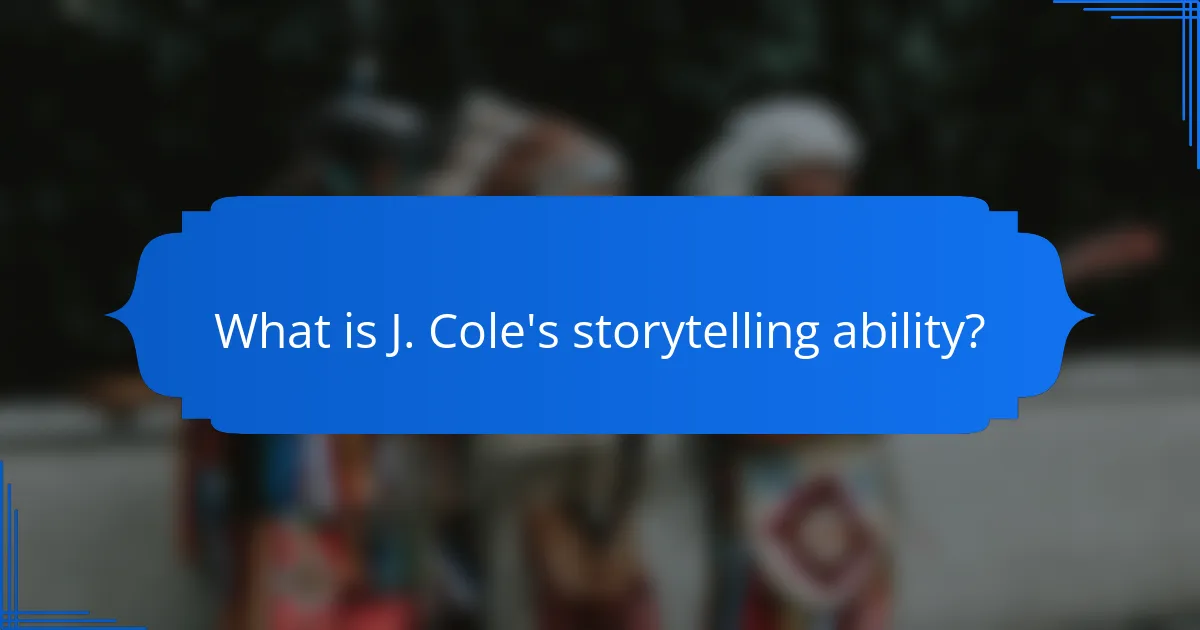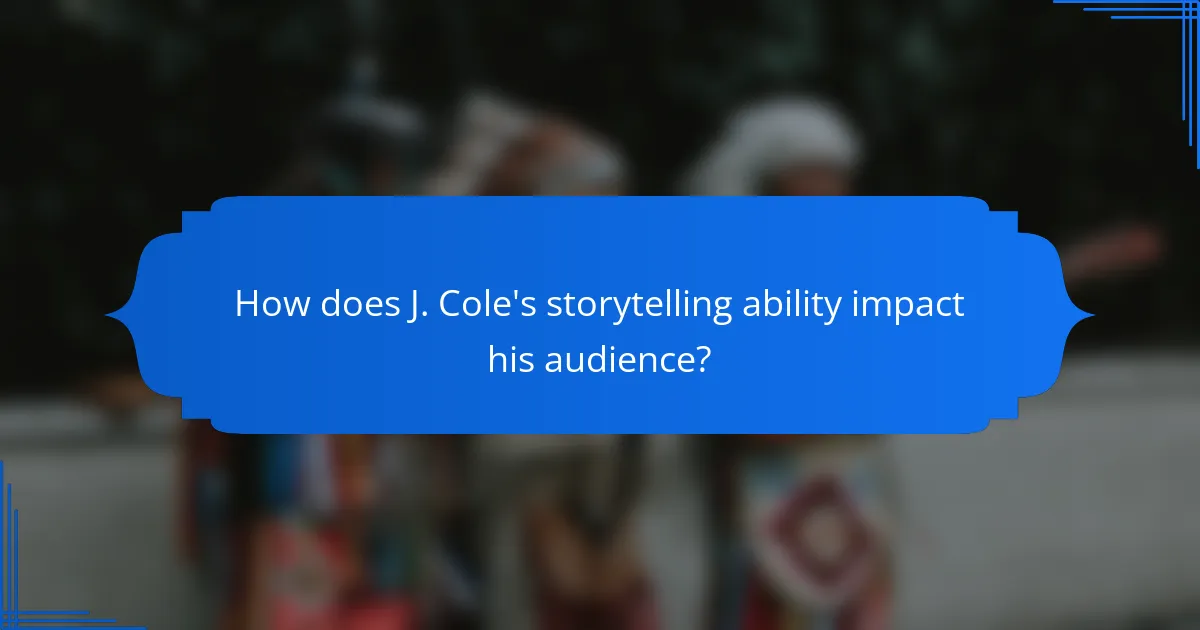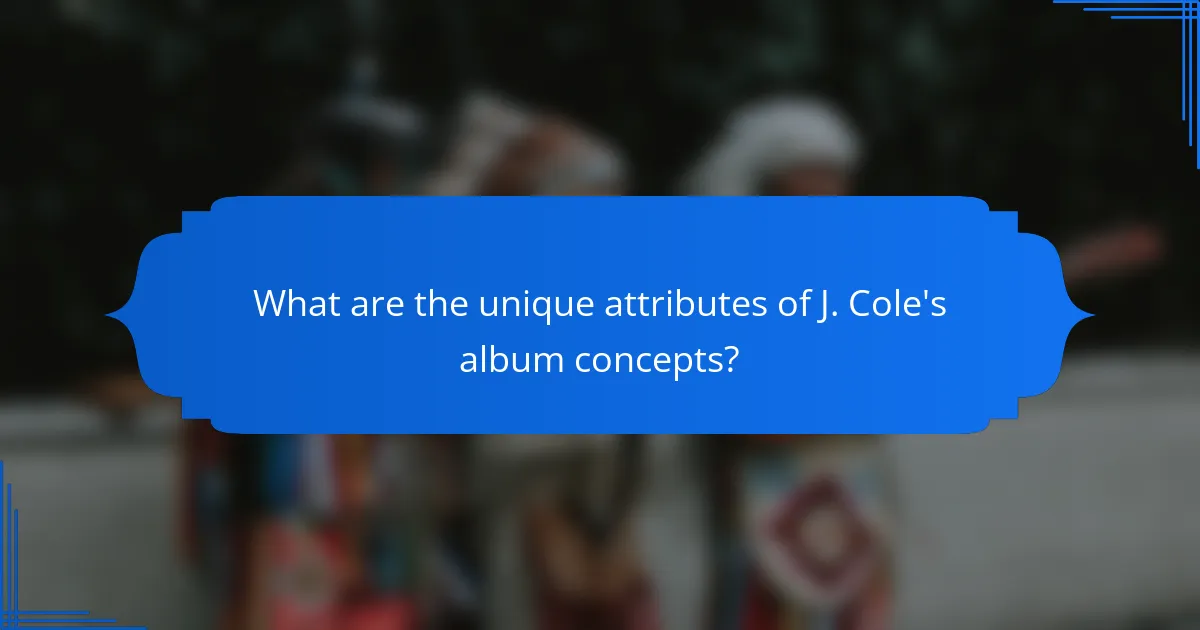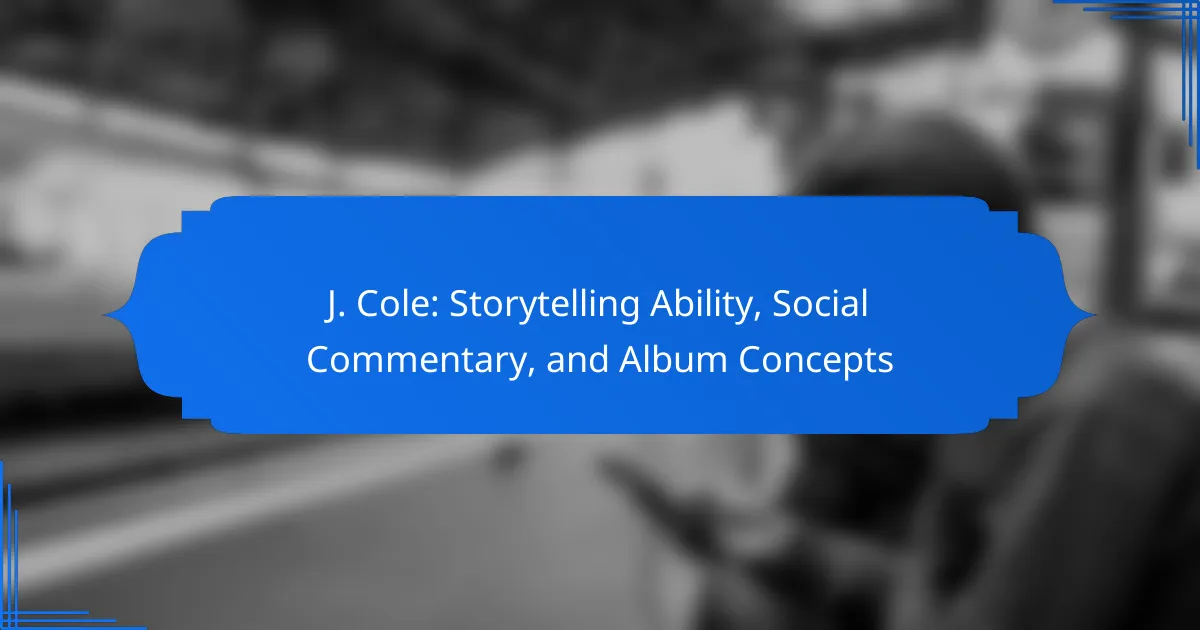J. Cole is a prominent hip-hop artist known for his exceptional storytelling ability, which often incorporates personal experiences and social commentary. His music explores themes such as struggle, ambition, and societal issues, with tracks like “Love Yourz” and “Lost Ones” exemplifying his emotional depth and relatability. Cole’s albums, particularly “2014 Forest Hills Drive,” showcase his narrative techniques and introspective approach, addressing topics like fame and mental health. Through vivid imagery and interconnected themes, J. Cole’s work fosters emotional connections with listeners, making him a significant voice in contemporary music.

What is J. Cole’s storytelling ability?
J. Cole’s storytelling ability is highly regarded in the hip-hop genre. He skillfully weaves personal experiences into his lyrics. His narratives often explore themes of struggle, ambition, and social issues. Cole’s song “Love Yourz” exemplifies his ability to convey deep emotional truths. In this track, he discusses the importance of self-acceptance and the pitfalls of envy. Critics have noted his unique perspective and relatable storytelling style. His albums, such as “2014 Forest Hills Drive,” showcase his narrative depth and character development. J. Cole’s storytelling resonates with listeners, making him a prominent voice in contemporary music.
How does J. Cole incorporate personal experiences into his narratives?
J. Cole incorporates personal experiences into his narratives by drawing from his life events and emotions. He often reflects on his upbringing in Fayetteville, North Carolina. This background influences the themes of struggle and aspiration in his music. Cole discusses family dynamics, relationships, and societal issues. His lyrics frequently include autobiographical elements, making his storytelling relatable. For example, in the song “4 Your Eyez Only,” he explores his father’s absence and its impact on his life. This personal touch adds depth to his narratives. His ability to weave these experiences into broader social commentary enhances the connection with listeners.
What specific events in J. Cole’s life influence his storytelling?
J. Cole’s storytelling is influenced by several specific events in his life. His experiences growing up in Fayetteville, North Carolina, shape much of his narrative. The struggles of his family, including financial hardships, inform his lyrics. Cole’s move to New York City to pursue music reflects his ambition and determination. His relationship with his father, who was absent during his childhood, adds depth to his themes of loss and reconciliation. Additionally, Cole’s experiences with racism and societal issues are prevalent in his work. His rise from humble beginnings to success serves as inspiration for his journey narratives. These events collectively enrich his storytelling, providing authenticity and relatability.
How do J. Cole’s lyrics reflect his background and upbringing?
J. Cole’s lyrics reflect his background and upbringing through personal storytelling and social commentary. He often discusses his experiences growing up in Fayetteville, North Carolina. His lyrics address themes of poverty, family dynamics, and racial identity. For example, in songs like “4 Your Eyez Only,” he shares insights into his father’s struggles and his own challenges. This autobiographical approach connects listeners to his journey. Additionally, he critiques systemic issues affecting his community. His song “The Climb Back” illustrates the pressure to succeed despite adversity. J. Cole’s authentic voice resonates with many, showcasing how his life experiences shape his artistry.
Why is social commentary a key element in J. Cole’s music?
Social commentary is a key element in J. Cole’s music because it addresses societal issues and personal experiences. He uses his platform to discuss topics like racism, poverty, and mental health. J. Cole’s lyrics often reflect the struggles faced by marginalized communities. His song “Fight the Feeling” critiques systemic oppression and highlights the importance of resilience. Furthermore, tracks like “4 Your Eyez Only” provide insight into the life of a friend who faced incarceration. This approach fosters a deeper connection with listeners. J. Cole’s storytelling ability enhances his social commentary, making it relatable and impactful. His work encourages dialogue and reflection on pressing social issues.
What social issues does J. Cole frequently address in his songs?
J. Cole frequently addresses social issues such as racial inequality, poverty, and mental health in his songs. He often discusses the struggles faced by marginalized communities. His lyrics reflect the impact of systemic racism on individuals and families. J. Cole highlights the challenges of growing up in low-income neighborhoods. He also explores themes of self-worth and personal identity. Songs like “Fight the Feeling” and “4 Your Eyez Only” exemplify these topics. His storytelling connects deeply with listeners experiencing similar hardships. J. Cole’s work encourages dialogue about these pressing social issues.
How does J. Cole’s perspective on societal problems resonate with listeners?
J. Cole’s perspective on societal problems resonates with listeners through relatable storytelling and authentic social commentary. His lyrics often reflect personal experiences and broader social issues. For instance, in songs like “Fight the Feeling,” he addresses mental health and systemic oppression. This connection allows listeners to see their own struggles in his narratives. Furthermore, J. Cole’s use of candid language fosters a sense of trust and understanding. He often highlights themes of inequality, poverty, and personal growth. His ability to articulate these issues makes them accessible and impactful. This engagement is supported by his substantial following and critical acclaim.
In what ways does J. Cole’s album concept contribute to his storytelling?
J. Cole’s album concept enhances his storytelling by providing a cohesive narrative framework. Each album often centers around a specific theme or personal experience. This thematic focus allows listeners to engage deeply with the emotional journey he presents. For example, “2014 Forest Hills Drive” explores his upbringing and the challenges he faced. The structure of the album mirrors a coming-of-age story, making his experiences relatable. Additionally, J. Cole uses interludes and skits to enrich the narrative. These elements create a cinematic feel, immersing the audience in his world. Overall, the album concept serves as a vehicle for profound social commentary and personal reflection.
What themes are commonly explored in J. Cole’s albums?
J. Cole’s albums commonly explore themes of personal struggle, social justice, and self-reflection. Personal struggle is often depicted through narratives of his upbringing and emotional challenges. Social justice is addressed through commentary on systemic issues and inequality. Self-reflection is a recurring element, where he examines his life choices and growth. These themes resonate with listeners, creating a deep connection. J. Cole’s lyrical content frequently incorporates autobiographical elements, enhancing authenticity. His storytelling ability weaves these themes into cohesive narratives across his discography.
How do the album titles reflect the concepts within the music?
Album titles in J. Cole’s discography often encapsulate the themes and narratives explored in the music. For example, “2014 Forest Hills Drive” reflects his personal journey and upbringing in Fayetteville, North Carolina. The title signifies a specific location tied to his life experiences, which are central to the album’s storytelling.
Additionally, “KOD” addresses issues such as addiction and the struggles of youth. The acronym stands for “Kids on Drugs,” “King Overdosed,” and “Kill Our Demons,” showcasing the multifaceted nature of the album’s themes. Each title serves as a lens through which listeners can understand the deeper social commentary present in the lyrics.
Furthermore, “The Off-Season” indicates a period of preparation and growth, mirroring Cole’s artistic evolution and dedication to his craft. This title aligns with the album’s focus on ambition and perseverance in the face of challenges.
Overall, J. Cole’s album titles are carefully chosen to reflect the core concepts of the music, providing insight into the narratives and social issues he addresses.

How does J. Cole’s storytelling ability impact his audience?
J. Cole’s storytelling ability profoundly impacts his audience by fostering emotional connections. His narratives often reflect personal experiences and societal issues. This relatability resonates with listeners, making them feel understood. For instance, in songs like “Lost Ones,” he explores themes of struggle and loss. Such themes can evoke empathy and reflection in his audience. Furthermore, his use of vivid imagery enhances the storytelling experience. This technique allows listeners to visualize the scenarios he describes. Research indicates that storytelling can enhance memory retention and emotional engagement. J. Cole’s ability to weave complex narratives contributes to his audience’s investment in his music.
What emotional responses do J. Cole’s stories evoke in listeners?
J. Cole’s stories evoke a range of emotional responses, including empathy, nostalgia, and introspection. Listeners often feel a deep connection to his narratives. His lyrics address personal struggles and societal issues, resonating with many. This relatability fosters a sense of understanding and validation among fans. Nostalgia is frequently triggered by his reflections on childhood and past experiences. Introspection arises as listeners contemplate their own lives and choices. J. Cole’s storytelling ability effectively captures complex emotions, making his music impactful.
How does J. Cole use imagery to create connections with his audience?
J. Cole uses vivid imagery to create emotional connections with his audience. His lyrics often paint detailed pictures of personal experiences and societal issues. For example, in “4 Your Eyez Only,” he describes the struggles of growing up in poverty. This imagery evokes empathy and allows listeners to relate to his story. Cole’s use of sensory details enhances the listener’s experience. He often references familiar settings and emotions that resonate with many. His storytelling approach makes complex themes accessible. Through imagery, he fosters a sense of shared understanding with his fans.
How do J. Cole’s narratives foster a sense of community among fans?
J. Cole’s narratives foster a sense of community among fans by addressing shared experiences and emotions. His storytelling often reflects the struggles of everyday life. This relatability creates a bond between him and his listeners. Fans see their own lives mirrored in his lyrics. Songs like “Love Yourz” emphasize self-acceptance and resilience. These themes resonate deeply, encouraging fans to connect with one another. J. Cole’s open discussions about mental health also promote dialogue within the community. His concerts become gatherings where fans unite over common values and experiences.
What role does vulnerability play in J. Cole’s music?
Vulnerability plays a significant role in J. Cole’s music. It allows him to connect deeply with listeners. Cole often shares personal struggles and emotions in his lyrics. This openness fosters authenticity and relatability. For example, in songs like “4 Your Eyez Only,” he reflects on his life experiences and fears. His vulnerability creates a narrative that resonates with many. It highlights themes of mental health and societal issues. By embracing vulnerability, J. Cole challenges traditional notions of masculinity in hip-hop. This approach has garnered him a dedicated fan base who appreciate his honesty.

What are the unique attributes of J. Cole’s album concepts?
J. Cole’s album concepts feature unique attributes such as deep storytelling, personal introspection, and social commentary. Each album often reflects his life experiences and growth. For instance, “2014 Forest Hills Drive” explores themes of fame and mental health. His use of narrative techniques creates a cinematic feel throughout his projects. Additionally, J. Cole often addresses societal issues, including racism and poverty, making his music relatable. The albums are structured to take listeners on a journey, with interconnected themes and motifs. His ability to blend personal and universal experiences sets his work apart in the hip-hop genre.
How does J. Cole structure his albums to enhance storytelling?
J. Cole structures his albums to enhance storytelling through a cohesive narrative arc. Each album often follows a chronological flow that reflects his personal experiences. He uses interludes and skits to provide context and depth. These elements create a dialogue that connects songs thematically. J. Cole frequently employs recurring motifs and characters throughout his albums. This technique reinforces key messages and emotional resonance. For example, “2014 Forest Hills Drive” tells a story of growth and reflection. The album’s structure allows listeners to journey with him, experiencing his evolution. Overall, J. Cole’s meticulous arrangement of tracks fosters a deeper connection with his audience.
What narrative techniques does J. Cole use across different albums?
J. Cole employs various narrative techniques across his albums. He often uses first-person storytelling to create personal connections. This technique allows listeners to experience his life events intimately. Cole also incorporates vivid imagery to paint detailed scenes in his lyrics. He frequently uses flashbacks to provide context and develop themes. Dialogue is another technique he employs, giving voice to different characters in his narratives. Additionally, he utilizes symbolism to convey deeper meanings in his songs. Cole’s storytelling often includes social commentary, addressing issues like race and inequality. These techniques collectively enhance the emotional impact of his music.
What are some notable album concepts by J. Cole?
J. Cole has several notable album concepts that explore personal and societal themes. “2014 Forest Hills Drive” reflects on his upbringing and the struggles of fame. The album is named after his childhood home, symbolizing his roots. “KOD” addresses issues like addiction and mental health. It serves as a commentary on the impact of drugs and the pressures of society. “The Off-Season” focuses on ambition and perseverance in the face of adversity. Each album showcases J. Cole’s storytelling ability and social commentary, resonating with listeners through relatable experiences.
How do specific albums like “2014 Forest Hills Drive” exemplify his storytelling style?
“2014 Forest Hills Drive” exemplifies J. Cole’s storytelling style through personal narratives and vivid imagery. The album details his upbringing and struggles in Fayetteville, North Carolina. It features anecdotes about family dynamics and the impact of fame. Songs like “Love Yourz” emphasize the importance of self-acceptance and authenticity. Cole uses relatable experiences to connect with listeners emotionally. His lyrics often reflect social issues, such as poverty and mental health. The album’s structure flows like a cohesive story, enhancing its narrative quality. This storytelling approach has resonated with audiences, solidifying Cole’s reputation as a skilled storyteller.
What practical tips can aspiring artists learn from J. Cole’s approach to storytelling?
Aspiring artists can learn several practical tips from J. Cole’s approach to storytelling. First, they should focus on authenticity. J. Cole often shares personal experiences, making his stories relatable. Second, they should develop strong characters. J. Cole crafts vivid personas that enhance his narratives. Third, they should utilize vivid imagery. His lyrics paint clear pictures that engage listeners. Fourth, artists should embrace vulnerability. J. Cole’s openness about struggles resonates deeply with audiences. Fifth, they should convey social commentary. He addresses relevant issues, adding depth to his storytelling. Lastly, they should experiment with structure. J. Cole often varies his song formats, keeping his work dynamic. These elements contribute to his compelling storytelling style.
J. Cole is a prominent figure in hip-hop known for his exceptional storytelling ability, which weaves personal experiences into his lyrics while addressing themes of struggle, ambition, and social issues. His music often reflects his upbringing in Fayetteville, North Carolina, and incorporates social commentary on topics such as racism and poverty. Key albums like “2014 Forest Hills Drive” and “KOD” exemplify his narrative depth, showcasing both personal introspection and broader societal critiques. J. Cole’s unique approach fosters emotional connections with listeners, making his work impactful and relatable.
